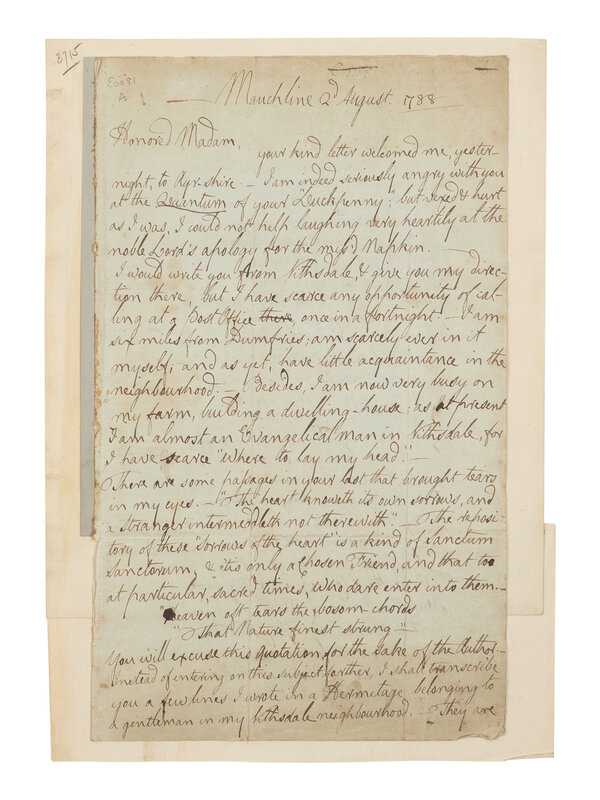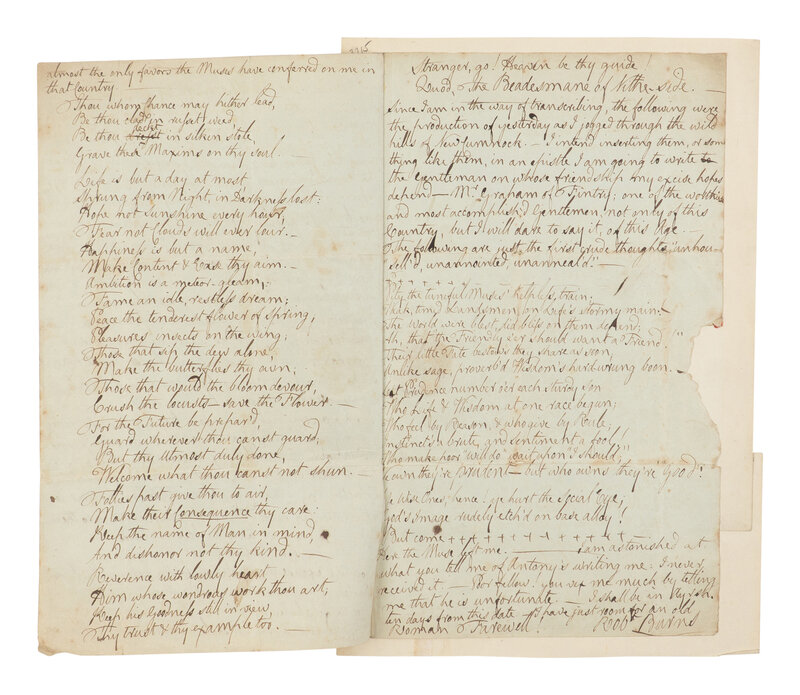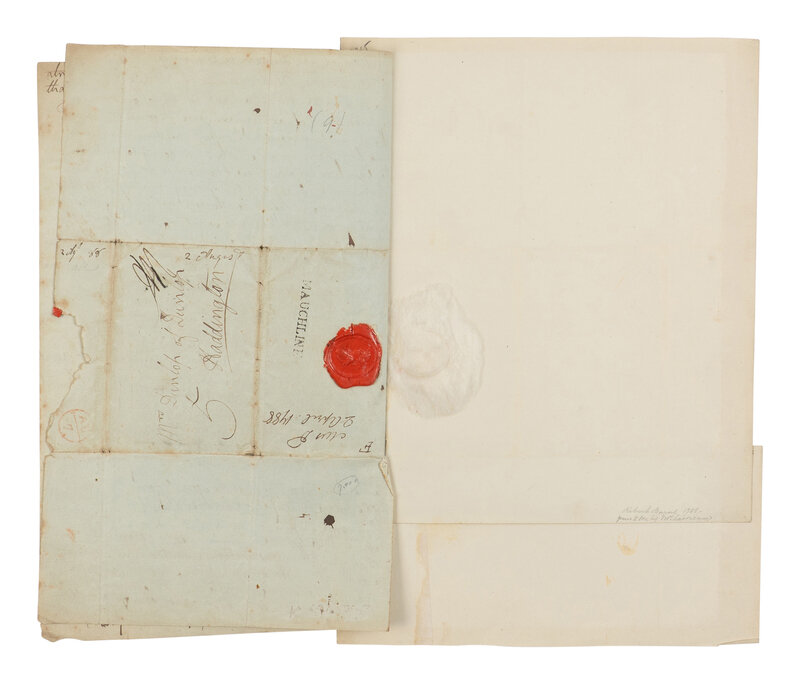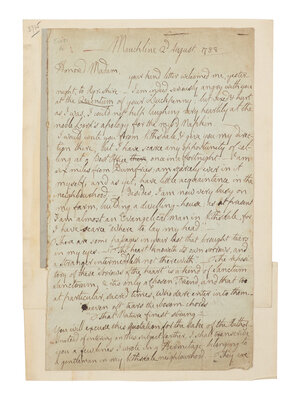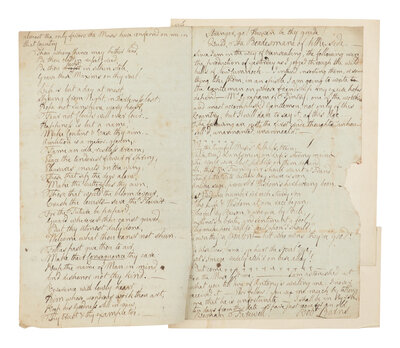Condition Report
Contact Information
Lot 103
Sale 6426 - Fine Printed Books & Manuscripts, Including Americana
Nov 13, 2025
10:00AM CT
Live / Chicago
Own a similar item?
Estimate
$20,000 -
30,000
Price Realized
$41,600
Sold prices are inclusive of Buyer’s Premium
Lot Description
BURNS, Robert (1759-1796). Autograph letter signed ("Robt. Burns"), to Frances Dunlop (addressed as "Mrs. Dunlop"), Mauchline, 2 August 1788.
3pp., folio (330 x 197 mm), approximately 650 words, original wax seal intact, tipped to album sheet, old folds, scattered toning, small marginal loss from seal, not affecting text; housed and laid into a black morocco portfolio (extremes rubbed). Provenance: Francis Edwards (listed in Index of English Literary Manuscripts as being owned by him in 1931); John Gribbel (1858-1936), American businessman and collector of Burns (bookplate); sold, his sale, Parke-Bernet, 30 October 1940, lot 106; Hugh Perkins, Armagh, RI (bookplate).
A REMARKABLE EPISTLE TO MRS. DUNLOP, CONTAINING ALL 32–LINES OF THE FIRST VERSION OF THE VERSES "WRITTEN IN FRIARS CARSE HERMITAGE" AND 12–LINES OF THE FIRST VERSION OF THE VERSES "FIRST EPISTLE OF ROBERT GRAHAM, ESQ."
Reads in part:
"There are some passages in your last that brought tears in my eyes. 'The heart knoweth its own sorrows, and a stranger intermeddleth not therewith.' The repository of these 'sorrows of the heart' is a kind of sanctum sanctorum, & 'tis only a chosen friend, and that to at particular, sacred times, who dare enter into them.
"'Heaven oft tears the bosom-chords
The Nature finest strung'
"You will excuse this quotation for the sake of the author. Instead of entering on this subject farther, I shall transcribe you a few lines I wrote in a Hermitage belonging to a gentleman in my Nithsdale neighbourhood, almost the only favors the Muses have conferred on me in that country.
"Thou whom Chance may hither lead
Be thou clad in russet weed
Be thou deckt in silken stole
Grave these Maxims on thy soul
Life is but a day at most
Sprung from night, Darkness lost
Hope not sunshine every hour
Fear not clouds will ever lour
Happiness is but a name
Make Content & Ease thy aim
Ambition is a meteor-gleam
Fame an idle restless dream...
For the Future be prepar'd
Guard wherever thou can'st guard
But thy utmost duly done
Welcome what thou canst not shun
Follies past give thou to air
Make their Consequence thy care
Keep the name of Man in mind
And dishonor not thy kind
Reverence with lowly heart
Him whose wondrous work thou art
Keep his goodness still in view
Thy trust & thy example too
Stranger, go! Heaven be thy guide!
Quod, The Beadsmane of Nithe-side."
THIS IS THE FIRST KNOWN VERSION OF THIS MANUSCRIPT VERSE (VERSION A). Smith, in The Index of English Literary Manuscripts (London: Mansell, 1986), lists this letter first—before the inscribed pane of glass now housed at the Ellisland Farm Museum, which Burns inscribed at the Hermitage—a summer house on Captain Robert Riddell’s Friars’ Carse estate—as a tribute to their friendship. Kinsley lists the letter as "MS not traced" in The Poems and Songs of Robert Burns (Oxford: Clarendon, 1968), footnote, p.414.
Burns revised it significantly in December that year, expanding from the original 32 lines to 55 lines. Both before and after that revision, he circulated it quite widely to friends in manuscript form, but he did not publish it himself till his two-volume Poems (1793). The present letter preserves one of these earlier drafts of that text, showing variant lines later altered or omitted in the revised version. It also differs slightly from the two listed above. Burns continues his letter, turning to the subject of his planned epistle to Robert Graham:
"I intend inserting them, or something like them, in an epistle I am going to write to the gentleman on whose friendship my excise hopes depend, Mr. Graham of Fintry, one of the...most accomplish'd gentlemen not only of this country, but... of this age. The following are just the first crude thoughts 'unhousell'd, unannounted, unanneal'd.
"Pity the tuneful muses helpless train
Weak, timid Landsmen on Life's stormy main
The world were blest did bliss on them depend
Ah, that 'the Friendly e'er should want a Friend!'
Their little Fate bestows they share as soon
Unlike sage, proverb'd Wisdom's hard-wrung boon
Let prudence number e'er each sturdy son
Who Life & Wisdom at one race begun
Who feel by Reason, & who give by Roule
Instinct's a brute, and sentiment a fool!
Who make poor 'will do' wait upon 'I should'
We own they're Prudent - but who owns they're good?..."
The above lines would later be incorporated—sometimes in altered form—into the “First Epistle to Robert Graham, Esq.,” which Burns sent to Graham sometime in 1789. Wallace assumes that Burns must have sent the full text of this epistle before that to Mrs. Dunlop sometime between the end of August and 12 September 1788, though that letter is now missing (Wallace, p.91). The final version was published in the Edinburgh Evening Courant on 9 February 1789.
THIS LETTER STANDS AMONG THE MOST INTIMATE OF THE BURNS-DUNLOP CORRESPONDENCE, which began in 1786 as Frances Dunlop (1730-1815) was struggling with depression after the loss of her husband, when a friend handed her a copy of Burns’s “The Cotter’s Saturday Night.” Moved by the poem, she wrote the young poet, asking for several copies and inviting him to visit her at Dunlop House—an overture that marked the beginning of a friendship and correspondence more voluminous than any other in Burns’s life. Though nearly thirty years his senior and from a different social world, Dunlop became both confidante and critic to Burns. He regularly sent her poems—often in manuscript before publication as seen here—and confided his joys and anxieties, while she offered advice and, at times, stern commentary, even admonishing him about the impropriety of his affairs: She described his correspondence as "an acquisition for which mine can make no return, as a commerce in which I alone am the gainer; the sight of your hand gives me inexpressible pleasure…”.
Dunlop championed Burns’s reputation, introducing his work to influential figures and urging him to establish literary connections that would prove crucial to his career. Yet, the relationship was not without turbulence. Political differences late in the 1790s—Burns’s remarks on the execution of the French king and queen—seemed to sever the exchange, leaving Burns deeply wounded and, near his death, desperate for reconciliation: “What sin of ignorance I have committed against so highly a valued friend I am utterly at a loss to guess…Will you be so obliging, dear Madam, as to condescend on that my offence which you seem determined to punish with a deprivation of that friendship which once was the source of my highest enjoyments?”. His last letter was sent only days before he died, expressing esteem and a hope for restored friendship—wishes that, according to some accounts, Dunlop belatedly answered, allowing Burns the comfort of her reconciliation at the very end.
The letter originally came from the collection of John Gribbel, a scholar and collector of Burns, who in December 1913 purchased from a Philadelphia broker the Glenriddell Manuscripts—the largest collection of Burns manuscripts in existence. At the annual banquet of the St. Andrew’s Society of Philadelphia on 1 December 1913, Gribbel announced that he had acquired them with the intention of returning them to the people of Scotland.
Ferguson, Letters of Robert Burns no. 99; Wallace, Robert Burns and Mrs. Dunlop Correspondence, pp.79-81.
